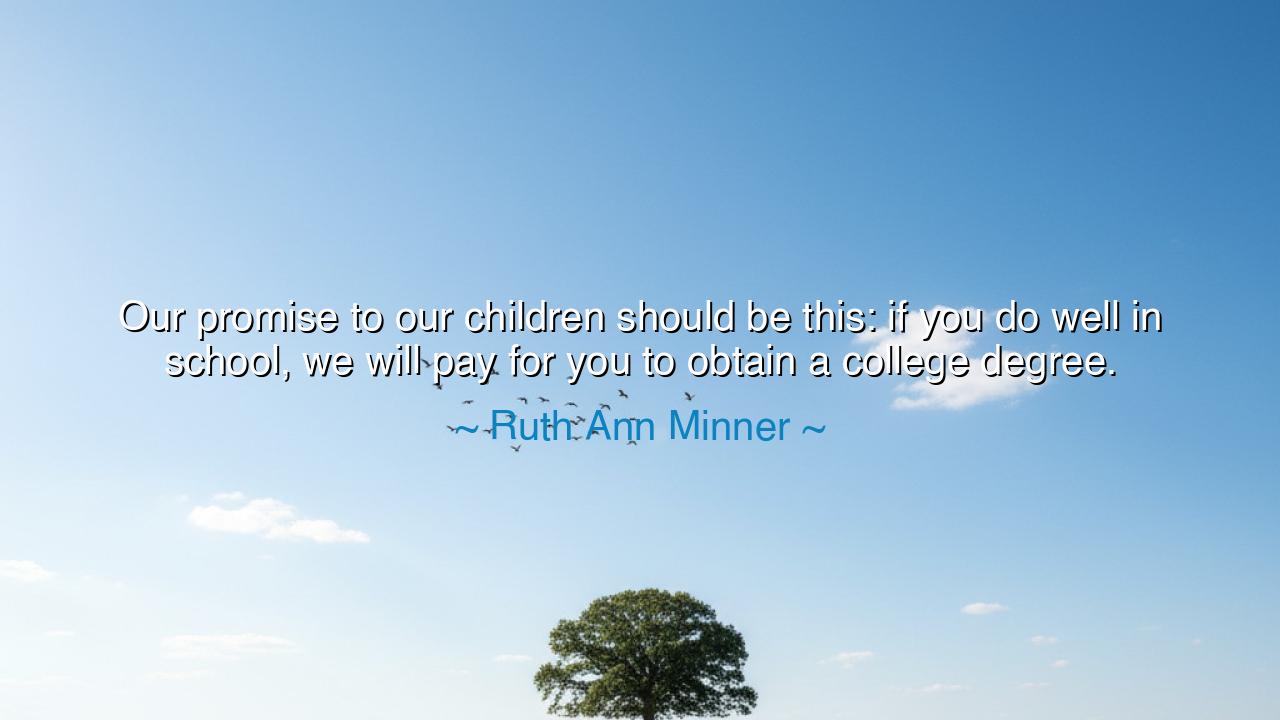
Our promise to our children should be this: if you do well in
Our promise to our children should be this: if you do well in school, we will pay for you to obtain a college degree.






The words “Our promise to our children should be this: if you do well in school, we will pay for you to obtain a college degree” spoken by Ruth Ann Minner carry the resonance of foresight, hope, and social covenant. Beneath their clarity lies a profound recognition that education is both a right and a responsibility, that society must not only exhort diligence but also provide the means for its fulfillment. Minner’s statement reflects a vision of intergenerational trust: a promise that effort will meet opportunity, that merit will be met with support, and that youth who commit themselves to learning will not be denied the tools to realize their potential.
In the style of the ancients, we might hear in Minner’s words the echoes of Aristotle and Cicero, who emphasized that society flourishes when it cultivates the virtue and skill of its citizens. To promise support for education is to acknowledge that talent alone cannot flourish without nurture and provision. The pledge to pay for a college degree is not merely financial; it is moral. It asserts that the elders, the leaders, and the guardians of society hold a sacred duty to empower the next generation, enabling them to contribute fully to the common good.
The origin of this insight lies in Minner’s work as a governor and advocate for education and social programs. She recognized that economic barriers often prevent bright, diligent young people from attaining higher education. A child’s effort in school should not be stifled by financial limitations. By framing education as a covenant between society and its youth, Minner underscores that investment in learning is an investment in the future — in civic vitality, in innovation, and in the moral and economic strength of the community.
History provides vivid illustrations of the power of such promises. Consider John Adams, who supported educational opportunities for youth in early America, understanding that a well-educated populace is essential for democracy to thrive. Similarly, Booker T. Washington, who overcame immense obstacles in his own life, emphasized both effort and opportunity, establishing institutions that enabled countless African American students to achieve excellence. Minner’s quote echoes this lineage: a society that keeps its promise to nurture talent strengthens itself as a whole.
Her words also carry the essence of motivation and accountability. By framing education as both effort and reward, Minner emphasizes that children must commit themselves to diligence and responsibility. The promise is conditional, yet inspiring: it reinforces the notion that hard work, perseverance, and learning are worthy of support and celebration. This dual principle — personal effort met by societal investment — cultivates a culture in which education is both valued and attainable.
Dear listener, the lesson here is timeless: society and family alike must create pathways for opportunity, and the individual must meet them with determination. To fulfill the promise of education is to honor both the potential of youth and the moral obligations of those who have the power to provide resources, guidance, and encouragement. Every investment in learning is not merely an expenditure, but a seed planted in the fertile ground of human possibility.
Take this lesson into your own life: if you are a parent, mentor, or leader, seek to remove obstacles for the young and reward their diligence with guidance and support. If you are a student or young person, embrace every opportunity to learn, knowing that your effort is sacred and worthy of investment. The covenant of education is a partnership, where both sides honor their role in shaping the future.
Finally, let Ruth Ann Minner’s words echo as both aspiration and duty: keep promises to the next generation, honor effort, and invest in education as the highest form of stewardship. When children are encouraged, supported, and given the tools to succeed, they do not merely achieve personal goals; they strengthen society, uphold justice, and build a legacy that endures. The promise of a college degree is more than an academic goal; it is a commitment to a future illuminated by knowledge, possibility, and human flourishing.






AAdministratorAdministrator
Welcome, honored guests. Please leave a comment, we will respond soon